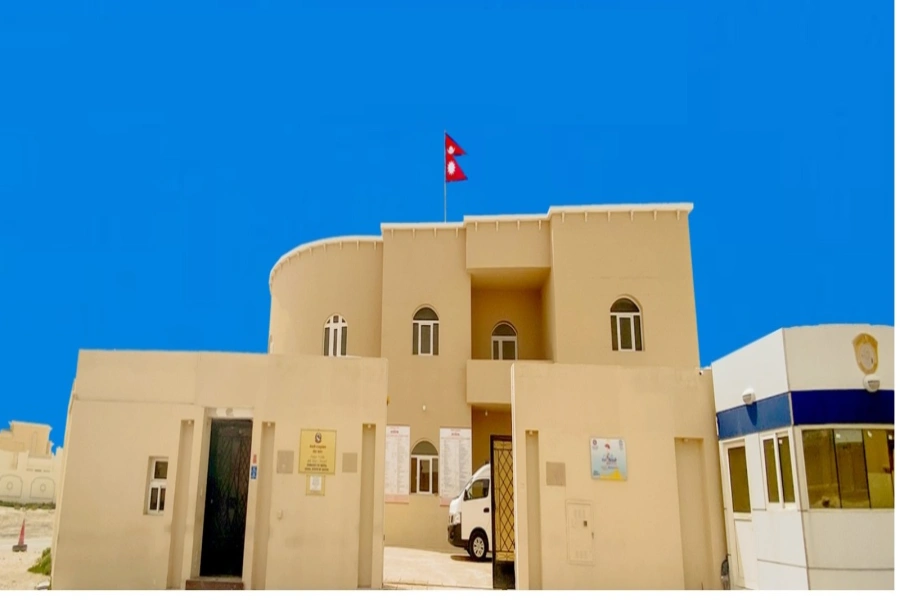Parbati Malakar has been earning her livelihood and taking care of her family by making and selling Gwarmari, a traditional Newari food item that’s made up of fried balls of puffy dough, in Indrachowk in Kathmandu for 15 long years. It’s not been easy but Malakar confesses that it’s a small price to pay to be able to take care of her family.
Always ready to serve customers with a smile and indulging in a little chit chat every now and then, Malakar works alongside her husband and says that business is satisfactory, if not as great as it once was, but that she is grateful for it.
Many people don’t even have the little that she does, she says.
However, Malakar guards her Gwaramari recipe with her life and keeps it a secret. Though it’s not hard to find various versions of the recipe on the internet these days, her recipe is special and she claims you can’t replicate it.
“I don’t usually share my recipe for Gwaramari because what if more people start making and selling it? My business would suffer, wouldn’t it?” she says, her eyes twinkling with mischief.
Clash between Citizenship-less Struggle Committee and Police at...

But it’s actually not the fear of someone stealing her recipe that stops her from sharing it but simply because no one ever asks. “People are content indulging in hot Gwaramari without having to do all the work,” she says. And Malakar is content serving some deep-fried dough balls early in the morning for a few rupees in return.
It wasn’t that Malakar was always in the Gwaramari selling business. When she started the business, she and her husband mostly made and sold Malpua, which is sweet pancake usually made during festivals and other celebrations. It was an old woman who used to buy Malpua from them on a regular basis who, one day, suggested they make and sell Gwaramari too.
The husband wife duo saw the potential of upping their daily income by serving this snack that people seemed to prefer with tea and thus took the advice. Malakar says that it helped that her husband already knew how to make Gwaramari.
Slowly word spread and people started queuing up outside their small makeshift stall in Indrachowk for some hot Gwaramari very early in the morning.
There was a time when business was really good. Today, not so much. Malakar says that she knows no business is ever constant and that she has made peace with the fact that they don’t earn as much as they once used to by selling Gwaramari anymore. She adds that business, by its very nature, is always changing but what makes her unhappy is that there isn’t much that she can do about it anymore.
Malakar laments that many people these days prefer big cafés and restaurants and sadly a small business like hers can never keep up. Times are changing and when you can’t evolve, you suffer, she says. “I like to think that since we run our stall from 6:30 to 7:30 in the morning, it could be too early for some people. I tell myself that is why we don’t get many customers anymore,” she says.
But she adds that she also blames the municipality authorities who often chase them away. It saddens her that they are treated so heartlessly at times. She recalls an incident when she and her husband had to carry their stoves and run away because they feared the municipality authorities would confiscate their things.
“They had once taken away an entire batch of Gwaramari that I could have sold to 10 people at least,” she says adding that it was a great loss, one that still hurts her. Every rupee matters to them. No amount is too small, she says.
“If they take our things, we won’t be able to earn our living from the very next day,” she says.
Because of this constant threat, they have now taken to putting up their stall inside a small alley and this has impacted their business. “Earlier, even if people didn’t know what Gwarmari was, they would randomly buy it just because it looked tempting. Now, as we have shifted inside, we only get our regular customers,” she says adding that it has lessened their earnings by half.
To compensate for that loss, alongside their early morning Gwaramari business, Malakar and her husband have taken to running a momo stall as well. Making and selling Gwaramari just wasn’t enough to sustain their family. Malakar says that the maximum they would earn by selling Gwaramari was Rs 1000 and, since living expenses have skyrocketed, that’s nothing.
But the duo isn’t going to give up. Malakar says that they still get up early in the morning and ready all the ingredients to prepare the Gwaramari because they know they will have at least a few customers to serve and thus earn a few rupees that is enough to pay a bill or two, if not take care of all their living expenses. And that, she says, is better than nothing.







































